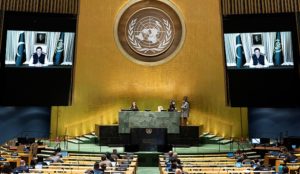UN leaders speak out against Islamophobia and anti-Muslim hatred
BY CHRISTINE DOUGLASS-WILLIAMS
SEE: https://www.jihadwatch.org/2021/03/un-leaders-speak-out-against-islamophobia-and-anti-muslim-hatred;
republished below in full unedited for informational, educational & research purposes:
The UN is doubling down on its efforts to stamp out so-called “Islamophobia.” While the UN advocates “policies that fully respect human rights and religious, cultural and unique human identity,” it makes no mention of the vast abuses of those rights which are routinely perpetrated by Muslims in the name of Islam across the world. Normative Islam creates no space for human rights, religious rights and equal rights for all. The ignoring of these critical issues by the UN should be glaring to every observer.
Renewed UN efforts against “Islamophobia” come on the heels of Pakistan (infamous for its cruel blasphemy laws) joining the Organization of Islamic Cooperation for the first-ever “International Day to Combat Islamophobia.”
A claim was also made by UN Secretary-General Antonio Guterres that “Islamophobia” and ‘anti-Muslim bigotry’ has risen to ‘epidemic proportions.'” But he provided no evidence.
Back in April 2019, the UN adopted a resolution to highlight the claim that “Islamophobia poses a threat to global peace.” The resolution, which decried the New Zealand mosque attack, was co-sponsored by Pakistan. It “strongly” condemned “continuing violence and acts of terrorism targeting individuals, including persons belonging to religious minorities, based on religion or belief.” One would think that such wording was referring to the genocide of Christians by Muslims in Africa and the Middle East, as well as the persecution of other religious minorities, including Ahmadis). But the resolution was aimed solely at so-called “Islamophobia.”
Globalist leaders who embrace the “Islamophobia” subterfuge are severely undermining the human rights of “infidels,” “kaffirs,” and “apostates” everywhere while empowering the jihad and the OIC’s Islamic supremacism.
More on this story. “UN leaders speak out against Islamophobia and anti-Muslim hatred,” UN News, March 17, 2021:
Underlining that “diversity is a richness, not a threat”, UN Secretary-General António Guterres called for greater investment in promoting social cohesion and tackling bigotry in a message on Wednesday to mark the International Day to Combat Islamophobia.
“We must continue to push for policies that fully respect human rights and religious, cultural and unique human identity”, he said in a pre-recorded video broadcast during a commemorative event held online, organized by the Organization of Islamic Cooperation (OIC).
“As the Holy Quran reminds us: nations and tribes were created to know one another.”
‘Epidemic’ of hatred
Nearly 60 countries are members of the OIC, which designated 15 March as the International Day to Combat Islamophobia.The Secretary-General cited a recent report to the UN Human Rights Council which found that suspicion, discrimination and outright hatred towards Muslims has risen to “epidemic proportions”.
Examples listed included disproportionate restrictions against Muslims manifesting their beliefs, limits on accessing citizenship, and widespread stigmatization of Muslim communities.
The study also highlighted how Muslim women face “triple levels of discrimination” because of their gender, ethnicity and faith, he added, while the media and some persons in power have further compounded stereotypes.
‘Distressing trends’ globally
“Anti-Muslim bigotry is sadly in line with other distressing trends we are seeing globally – a resurgence in ethno-nationalism, neo-Nazism, stigma and hate speech targeting vulnerable populations including Muslims, Jews, some minority Christian communities as well as others”, the Secretary-General said.Stressing that “discrimination diminishes us all”, the UN chief called for safeguarding the rights of minority communities, many of whom are under threat.
“As we move toward evermore multi-ethnic and multi-religious societies, we need political, cultural and economic investments to strengthen social cohesion and tackle bigotry,” he stated.
The Secretary-General underscored that fighting discrimination, racism and xenophobia is a priority for the United Nations.
Promoting respect among religions
Following a fall-out in relations between many Muslim countries and some Western nations in the wake of the September 11 terrorist attacks in the United States – and subsequent attacks in London, Madrid and Bali – the Organization established the UN Alliance of Civilizations (UNAOC) in 2005.Miguel Ángel Moratinos, the current UNAOC High Representative, recalled the initiative was launched as a “political soft power tool” whose objectives include promoting mutual respect among diverse cultures and religions.
“Despite progress made in building bridges of understanding through the promotion of intercultural and interfaith dialogue, manifestations of anti-Muslim hatred persisted and morphed into different forms”, he said.
“Islamophobia cannot be seen in isolation from the worrying increase in xenophobia and hate speech against minorities including immigrants and other faith communities.”
Mr. Moratinos said mutual respect, interfaith harmony and peaceful co-existence can be achieved “when there is broad space for everyone to practice the rituals of their religions or beliefs freely and safely.”
Solidarity, equality, respect
For the President of the UN General Assembly, Turkish diplomat Volkan Bozkir, any form of discrimination, including based on religion or belief, “is a deeply personal attack”.
He urged countries to re-commit to the UN Charter, the Universal Declaration of Human Rights and other related instruments, expressing hope that they will lay the foundation for national laws to end hate speech and hate crimes.
“Today our conversation is focused on Islamophobia, but the source of this scourge is a source that imperils us all. The answer is solidarity, equality, and respect for the equal dignity and entitlement to fundamental human rights of every individual”, he said.
Mr. Bozkir added that protecting people from extremism requires a global strategy that includes defeating all forms of violent ideologies.
He called for building resilience to discriminatory, exclusionary, and intolerant teachings, and developing respect for the religious and cultural practices of others. ….

